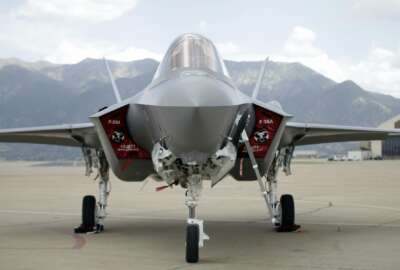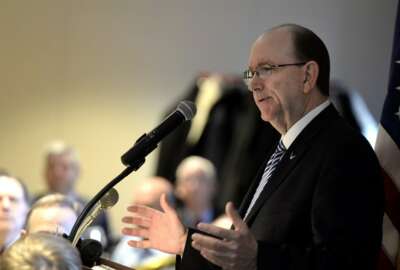
Next Air Force Pitch Day will focus on space and time to market
The Air Force's second Pitch Day is looking for technologies facing the final frontier.
After a successful day of rapidly handing out contracts to businesses with innovative ideas last month, the Air Force will replicate its Pitch Day this fall to focus on space issues.
In case you haven’t noticed, space is a pretty big deal right now — read Space Force. The Air Force is ready to put its money where its mouth is and actually give companies money on the same day their idea is pitched in hopes of growing the defense industrial base.
“The reason we wanted to do the Pitch Day event was to demonstrate to industry and to tech startups they could count on cash from us the day that we said,” Will Roper, Air Force assistant secretary for acquisition, technology and logistics, said Friday during an Air Force Association event in Arlington, Virginia.
Part of the need for a Pitch Day and for a change in the way the Air Force approaches acquisition in the first place, Roper said, is that the threat landscape is changing.
Building weapons systems worth hundreds of millions of dollars over years isn’t cutting it in the 21st century. Plus, companies are likely to go to the private marketplace for things like drones, software and lasers, which are the weapons of the future.
“We are still doing great technology inside the government,” Roper said. “But that’s part of a much bigger tech ecosystem that includes commercial development and academic development. If technology is everywhere, then that model we have from the Cold War that matures technology and puts it in systems and makes the moves in the chess game decades apart is dangerous to carry into this century.”
Roper said the model from the Cold War is based on technology exclusivity that is secret and able to surprise the enemy. That world is now gone.
“The only thing that makes sense to me,” Ropers said. “Is that time to market has to be your cutting edge. It’s eventually going to be copied and ripped off, so be there first. Be able to productize first. By the time your second responders have done that; you’re on to something else.”
Pitch Day is the beginning of that.
The Air Force is bringing new companies into the fold with new ideas and allowing them to move quickly within the federal acquisition regulations.
Pitch Day’s premise is simple — bring in companies, listen to a 10-minute pitch, spend 5 minutes asking questions and then, if the Air Force likes the idea, hand them a contract before they step out the door.
So far the Air Force is casting a wide net of investments. The Air Force awarded $3.5 million to 51 companies during the first Pitch Day, which will grow in installments to $8.75 million. Before the day itself, the Air Force gave out even more funds to small and emerging businesses. It awarded 122 phase 1 contracts worth $6 million and 69 phase 2 contracts totaling $60 million. That’s a grand total of 242 contracts worth $75 million.
What’s great for the businesses is that by getting the money right away they don’t need bridge loans. Getting money from a contract the same day means paying payroll that week for some small businesses, Roper said.
The Air Force has a $660 million budget to work with for things like Pitch Day, but it’s not stopping there.
Roper wants to tap another $200 million the Air Force has to move technologies from universities and into a business setting.
The Air Force signed a memorandum of understanding with MIT two weeks ago to work on artificial intelligence.
“We are creating an AI accelerator to get research up at their Computer Science and AI Laboratory to get ideas out and into companies,” Roper said. “I hope that by the time we are done with this and we bring the billions of dollars that we have to bear that an innovator anywhere in this country will say, ‘I’m going to the Air Force first because I know I have nothing to lose. I can trust they can deliver on the day they say. They are cash dilute. They are not going to ask for equity in my company. And we have fairly low return on investment expectations; we are a very patient investor compared to the venture capitalist world.”
Copyright © 2025 Federal News Network. All rights reserved. This website is not intended for users located within the European Economic Area.
Scott Maucione is a defense reporter for Federal News Network and reports on human capital, workforce and the Defense Department at-large.
Follow @smaucioneWFED
Related Stories





